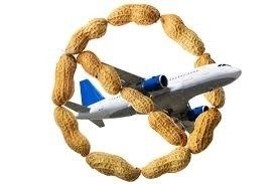In seat 32F, Geoff Knight opens his snack-size bag of peanuts, tips a small pile of nuts into his hand and drops them into his mouth. The camera zooms in on a tiny, sub-micron shard of peanut debris that accidently finds its way out of Geoff’s mouth. The camera pans around, tracking the shard as it swirls upwards towards the overhead lockers.
45 seconds later, in seat 14A, four-year-old Holly Payne starts tugging on her mother’s arm. The first signs of anaphylactic shock begin to kick in.
Two minutes later, the cabin-crew are scrabbling around looking for the emergency epi-pen before Holly’s throat closes up completely. For a moment it’s touch and go whether Holly is going to make it or not. Some of the crew look frightened. Next time, they vow, we’ll make sure no-one eats nuts on the plane. Handing out pretzels and telling passengers not to eat nuts for a couple of hours is a tiny sacrifice. Who wouldn’t abide if they knew the stakes?
This is how fragile we have become. The bottom – hopefully the bottom – of a long, slippery slope of best intentions delivering worst possible outcomes. Doing incredible harm by mandating the opposite.
40 years ago kids ate dirt. I remember a friend of mine telling me how his parents had caught his little sister eating what they thought were raisins off the kitchen floor. They turned out to be woodlice. They stopped the child from eating any more, but the main thing my friend remembered was how they’d also burst out laughing. Partly because their daughter was eating woodlice, but also partly because they didn’t know exactly how many.
Eating woodlice is probably not such a good idea. If we eat them and they make us sick, that’s a precious feedback loop: now we know not to eat them again. If we eat them and we don’t get sick, it was probably okay. Natural systems are full of these kinds of feedback loops. They’re an important aspect of sustainable self-organising systems. They’re also an important way of making those systems more resilient. Natural systems need to be stressed. If we remove the stress, we make them weaker, and more fragile. During the last 40 years, by making the world a lot cleaner, more sterile place, we’ve made ourselves a lot more fragile. Allergies at epidemic levels; asthma at epidemic levels. We’re literally sanitising ourselves to the edge of oblivion.
Don’t get me wrong, I have massive sympathy for Holly Payne and her parents. Having a child so allergic to such small quantities of peanut dust (it’s a true story, by the way, albeit I changed the names) must be a living nightmare for them. But the answer to their tough problem really isn’t to start banning peanuts on aeroplanes for everyone else.
I don’t mean this in a selfish, ‘I like nuts, so why should I stop eating them?’ way. I’d be very willing to help arrange for Holly to walk around in her own hermetically-sealed flying suit with it’s own dedicated ultra-pure oxygen supply if needs be. What I’m trying to get at is that attempts to ban nuts on planes – or anywhere else for that matter – causes harm to all of us. The reason we’re not all – yet – allergic to peanuts and other ‘contaminants’ is that we get to breathe un-cleaned, un-conditioned air that’s full of all sorts of microscopic harmful crap. That’s the stuff that keeps us all resilient and healthy.

